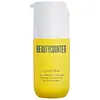What's inside
What's inside
 Key Ingredients
Key Ingredients

 Benefits
Benefits

 Concerns
Concerns

 Ingredients Side-by-side
Ingredients Side-by-side

Water
Skin ConditioningPropanediol
SolventButylene Glycol
HumectantPhytic Acid
Glycerin
HumectantPhenoxyethanol
PreservativeSodium Hydroxide
BufferingAmmonium Acryloyldimethyltaurate/Vp Copolymer
Ethylhexylglycerin
Skin ConditioningXanthan Gum
EmulsifyingLecithin
EmollientSodium Phytate
Tetraselmis Suecica Extract
Skin ConditioningSodium Benzoate
MaskingLactic Acid
BufferingPotassium Sorbate
PreservativeWater
Skin ConditioningPropanediol
SolventBis-Glyceryl Ascorbate
AntioxidantTetrahexyldecyl Ascorbate
AntioxidantPentylene Glycol
Skin ConditioningCoconut Alkanes
EmollientGlycerin
HumectantHydroxyethyl Acrylate/Sodium Acryloyldimethyl Taurate Copolymer
Emulsion StabilisingCurcuma Longa Root Extract
MaskingMyrciaria Dubia Fruit Extract
Skin ConditioningCurcumin
AntioxidantSodium Hyaluronate
HumectantPrunus Amygdalus Dulcis Oil
Skin ConditioningPhytic Acid
Citrus Aurantium Bergamia Fruit Oil
MaskingCoco-Caprylate/Caprate
EmollientPolyglyceryl-6 Polyricinoleate
EmulsifyingCitrus Nobilis Peel Oil
MaskingCitrus Aurantium Dulcis Flower Oil
AstringentEthylhexylglycerin
Skin ConditioningPotassium Sorbate
PreservativePhenoxyethanol
PreservativeDecanal
MaskingCitrus Aurantium Dulcis Peel Oil
MaskingIonone
AstringentEthyl Lactate
PerfumingVanillin
MaskingIsoamyl Acetate
SolventEthyl 2-Methylbutyrate
PerfumingMethoxyphenylbutanone
PerfumingOxacycloheptadec-10-En-2-One
PerfumingDimethylhydroxy Furanone
MaskingEthyl Propionate
PerfumingEthyl Cinnamate
PerfumingHexenyl Acetate
MaskingTriethyl Citrate
MaskingBenzyl Acetate
MaskingEthyl Acetate
PerfumingCitral
PerfumingLimonene
PerfumingLinalool
PerfumingWater, Propanediol, Bis-Glyceryl Ascorbate, Tetrahexyldecyl Ascorbate, Pentylene Glycol, Coconut Alkanes, Glycerin, Hydroxyethyl Acrylate/Sodium Acryloyldimethyl Taurate Copolymer, Curcuma Longa Root Extract, Myrciaria Dubia Fruit Extract, Curcumin, Sodium Hyaluronate, Prunus Amygdalus Dulcis Oil, Phytic Acid, Citrus Aurantium Bergamia Fruit Oil, Coco-Caprylate/Caprate, Polyglyceryl-6 Polyricinoleate, Citrus Nobilis Peel Oil, Citrus Aurantium Dulcis Flower Oil, Ethylhexylglycerin, Potassium Sorbate, Phenoxyethanol, Decanal, Citrus Aurantium Dulcis Peel Oil, Ionone, Ethyl Lactate, Vanillin, Isoamyl Acetate, Ethyl 2-Methylbutyrate, Methoxyphenylbutanone, Oxacycloheptadec-10-En-2-One, Dimethylhydroxy Furanone, Ethyl Propionate, Ethyl Cinnamate, Hexenyl Acetate, Triethyl Citrate, Benzyl Acetate, Ethyl Acetate, Citral, Limonene, Linalool
 Reviews
Reviews

Ingredients Explained
These ingredients are found in both products.
Ingredients higher up in an ingredient list are typically present in a larger amount.
Ethylhexylglycerin (we can't pronounce this either) is commonly used as a preservative and skin softener. It is derived from glyceryl.
You might see Ethylhexylglycerin often paired with other preservatives such as phenoxyethanol. Ethylhexylglycerin has been found to increase the effectiveness of these other preservatives.
Glycerin is already naturally found in your skin. It helps moisturize and protect your skin.
A study from 2016 found glycerin to be more effective as a humectant than AHAs and hyaluronic acid.
As a humectant, it helps the skin stay hydrated by pulling moisture to your skin. The low molecular weight of glycerin allows it to pull moisture into the deeper layers of your skin.
Hydrated skin improves your skin barrier; Your skin barrier helps protect against irritants and bacteria.
Glycerin has also been found to have antimicrobial and antiviral properties. Due to these properties, glycerin is often used in wound and burn treatments.
In cosmetics, glycerin is usually derived from plants such as soybean or palm. However, it can also be sourced from animals, such as tallow or animal fat.
This ingredient is organic, colorless, odorless, and non-toxic.
Glycerin is the name for this ingredient in American English. British English uses Glycerol/Glycerine.
Learn more about GlycerinPhenoxyethanol is a preservative that has germicide, antimicrobial, and aromatic properties. Studies show that phenoxyethanol can prevent microbial growth. By itself, it has a scent that is similar to that of a rose.
It's often used in formulations along with Caprylyl Glycol to preserve the shelf life of products.
Phytic Acid is a gentle AHA and antioxidant. AHAs are chemical exfoliants that help remove dead skin cells. Phytic Acid has a slight and mild exfoliating effect.
The chemical makeup makes it classified as an AHA, much like lactic acid.
In some cases, it is a chelating agent. Chelating agents help prevent metals from binding to water, helping to stabilize the ingredients in a product.
An interesting fact about phytic acid is that it is considered an antinutrient. People do not have the enzyme needed to properly breakdown and digest phytic acid. When ingested, phytic acid binds to minerals and prevents them from being absorbed.
Read more about some other popular AHA's here:
Learn more about Phytic AcidPotassium Sorbate is a preservative used to prevent yeast and mold in products. It is commonly found in both cosmetic and food products.
This ingredient comes from potassium salt derived from sorbic acid. Sorbic acid is a natural antibiotic and effective against fungus.
Both potassium sorbate and sorbic acid can be found in baked goods, cheeses, dried meats, dried fruit, ice cream, pickles, wine, yogurt, and more.
You'll often find this ingredient used with other preservatives.
Learn more about Potassium SorbatePropanediol is an all-star ingredient. It softens, hydrates, and smooths the skin.
It’s often used to:
Propanediol is not likely to cause sensitivity and considered safe to use. It is derived from corn or petroleum with a clear color and no scent.
Learn more about PropanediolWater. It's the most common cosmetic ingredient of all. You'll usually see it at the top of ingredient lists, meaning that it makes up the largest part of the product.
So why is it so popular? Water most often acts as a solvent - this means that it helps dissolve other ingredients into the formulation.
You'll also recognize water as that liquid we all need to stay alive. If you see this, drink a glass of water. Stay hydrated!
Learn more about Water